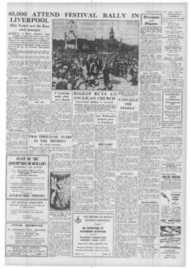Page 6, 3rd August 1951
Page 6

Report an error
Noticed an error on this page?If you've noticed an error in this article please click here to report it.
Tags
Share
Related articles
Big Changes Are
I Sell The 'c.h.' On
Showdown With Spanish Workers
Itestions Of The Week '
The Greatest Social Worker Of All Time
WORKERS' BISHOP MIDDLE CLASS
Providential link between extremes'
A WARNING against hostility towards the middle class was given by Bishop Miguel de Andrea-long known as one of the greatest champions of the poorer workers in South America-when he spoke on Women Workers' Day in Buenos Aires, after members of 26 trade
unions had attended Mass.
The middle class is a providential bridge linking two extreme social levels, said Mgr. de Andrea, and to oppose it or burden It with destructive hardships constitutes an attempt against the stability of the social order.
The Bishop, who 19 years ago founded Catholic Associations of Women Employees, can be no charity without justice nor justice
He urged that in the bottle
the Federation of remarked that there without charity.
against Comntunism Catholics
should talk less and do more. Drawing inspiration front an addles's by the Holy Father lo workers gathered in Rome for the commemoration of the Social Encyclicals Rerun, Novarum and Quadrageitno A um), he said;
"Because of the downfall of the liberal system, there appeared some modern redeemers who believed that the solution of social problems was to be found in stale monopolies.
DICTATORSHIP
"Thus totalitarianisms were born, such as Communism a ad neoFascism.
"When violation of the law begins, anarchy appears, and ends in oppression and force. Dictatorship, a system fatal to Governments and peoples, follows.
"In the application of such a system a dismal coincidence in the social order is always observed: a hostility towards the middle class, which is a part of the social structure of the nation, and in which the family, without the benefits of abundance nor the temptations of poverty, may more easily preserve Christian customs and observe moral duties that dignify and elevate." Bishop de Andrea spoke of the pretension of "unifying the social classes," and called it a "Utopia equal to that of trying to make uniform the limbs of the human body."
SEVEN POINTS
Rather, he said, the "differences between social classes facilitate the interchange and give-and-take re quired for a peaceful human society." [Reports front Buenos Aires have called attention in this connection to the Argentine Government's attempts to erase class distinction through a policy of
fusticialism," in which the labour stratum of society is favoured Jr the expense of the middle and capitalist classes.]
Bishop de Andrea ended by making these points:
1. Without allowing ourselves to be deluded by the Utopia of class
suppression, we desire harmony and peace among the various classes.
2. We oppose the suppression of private property and recommend that ownership be available to the majority of people.
3. We prefer a lower cost of living to higher wages.
4. We desire a higher standard of living for the poor, hut without lowering the standard of those in better circumstances in order to accomplish I his.
5. We expect from everyone respect for the dignity of the human person, and on our part we promise equal respect for everyone, particularly those who are invested with legitimate authority.
6. We reaffirm our rights and resolution to uphold them; and we acknowledge our duties with the irrevocable intention of carrying them out.
7. As strong partisans of domestic social, national and international peace, we are stubborn enemies of war. except of war against disproportionate ambition and hate, which are generators of all wars."
blog comments powered by Disqus







